综合英语教程3课文翻译unite3
(完整版)综合教程3课文翻译
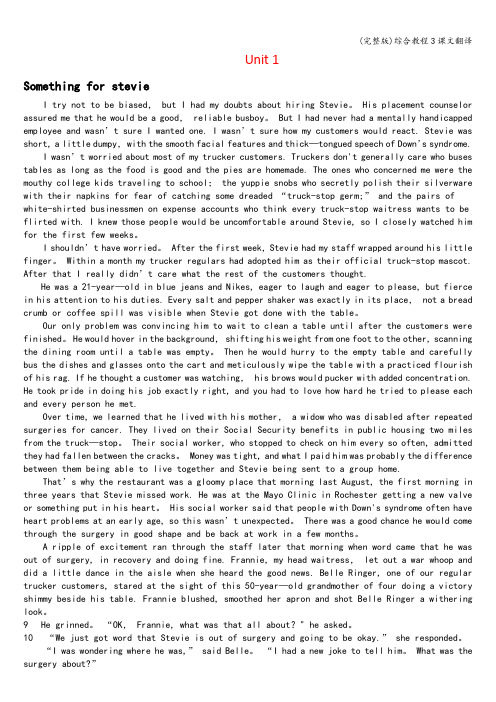
Unit 1Something for stevieI try not to be biased, but I had my doubts about hiring Stevie。
His placement counselor assured me that he would be a good, reliable busboy。
But I had never had a mentally handicapped employee and wasn’t sure I wanted one. I wasn’t sure how my customers would react. Stevie was short, a little dumpy, with the smooth facial features and thick—tongued speech of Down’s syndrome.I wasn’t worried about most of my trucker customers. Truckers don't generally care who buses tables as long as the food is good and the pies are homemade. The ones who concerned me were the mouthy college kids traveling to school; the yuppie snobs who secretly polish their silverware with their napkins for fear of catching some dreaded “truck-stop germ;” and the pairs of white-shirted businessmen on expense accounts who think every truck-stop waitress wants to be flirted with. I knew those people would be uncomfortable around Stevie, so I closely watched him for the first few weeks。
全新版大学英语综合教程3课文原文及翻译
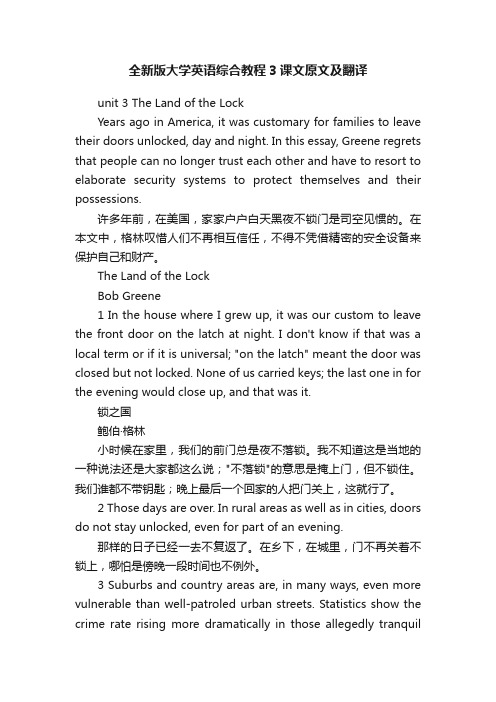
全新版大学英语综合教程3课文原文及翻译unit 3 The Land of the LockYears ago in America, it was customary for families to leave their doors unlocked, day and night. In this essay, Greene regrets that people can no longer trust each other and have to resort to elaborate security systems to protect themselves and their possessions.许多年前,在美国,家家户户白天黑夜不锁门是司空见惯的。
在本文中,格林叹惜人们不再相互信任,不得不凭借精密的安全设备来保护自己和财产。
The Land of the LockBob Greene1 In the house where I grew up, it was our custom to leave the front door on the latch at night. I don't know if that was a local term or if it is universal; "on the latch" meant the door was closed but not locked. None of us carried keys; the last one in for the evening would close up, and that was it.锁之国鲍伯·格林小时候在家里,我们的前门总是夜不落锁。
我不知道这是当地的一种说法还是大家都这么说;"不落锁"的意思是掩上门,但不锁住。
我们谁都不带钥匙;晚上最后一个回家的人把门关上,这就行了。
全新版大学英语综合教程3各单元summary课本原文及翻译
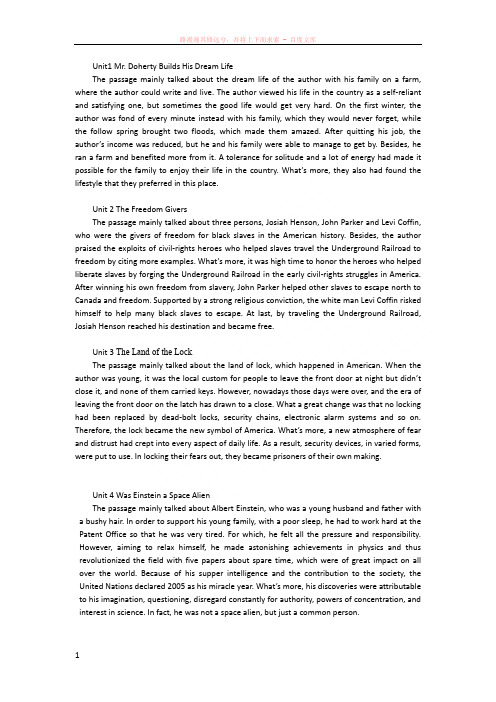
Unit1 Mr. Doherty Builds His Dream LifeThe passage mainly talked about the dream life of the author with his family on a farm, where the author could write and live. The author viewed his life in the country as a self-reliant and satisfying one, but sometimes the good life would get very hard. On the first winter, the author was fond of every minute instead with his family, which they would never forget, while the follow spring brought two floods, which made them amazed. After quitting his job, the author’s income was reduced, but he and his family were able to manage to get by. Besides, he ran a farm and benefited more from it. A tolerance for solitude and a lot of energy had made it possible for the family to enjoy their life in the country. What’s more, they also had found the lifestyle that they preferred in this place.Unit 2 The Freedom GiversThe passage mainly talked about three persons, Josiah Henson, John Parker and Levi Coffin, who were the givers of freedom for black slaves in the American history. Besides, the author praised the exploits of civil-rights heroes who helped slaves travel the Underground Railroad to freedom by citing more examples. What’s more, it was high time to honor the heroes who helped liberate slaves by forging the Underground Railroad in the early civil-rights struggles in America. After winning his own freedom from slavery, John Parker helped other slaves to escape north to Canada and freedom. Supported by a strong religious conviction, the white man Levi Coffin risked himself to help many black slaves to escape. At last, by traveling the Underground Railroad, Josiah Henson reached his destination and became free.Unit 3 The Land of the LockThe passage mainly talked about the land of lock, which happened in American. When the author was young, it was the local custom for people to leave the front door at night but didn’t close it, and none of them carried keys. However, nowadays those days were over, and the era of leaving the front door on the latch has drawn to a close. What a great change was that no locking had been replaced by dead-bolt locks, security chains, electronic alarm systems and so on. Therefore, the lock became the new symbol of America. What’s more, a new atmosphere of fear and distrust had crept into every aspect of daily life. As a result, security devices, in varied forms, were put to use. In locking their fears out, they became prisoners of their own making.Unit 4 Was Einstein a Space AlienThe passage mainly talked about Albert Einstein, who was a young husband and father with a bushy hair. In order to support his young family, with a poor sleep, he had to work hard at the Patent Office so that he was very tired. For which, he felt all the pressure and responsibility. However, aiming to relax himself, he made astonishing achievements in physics and thus revolutionized the field with five papers about spare time, which were of great impact on all over the world. Because of his supper intelligence and the contribution to the society, the United Nations declared 2005 as his miracle year. What’s more, his discoveries were attributable to his imagination, questioning, disregard constantly for authority, powers of concentration, and interest in science. In fact, he was not a space alien, but just a common person.Unit 5 Three Thank-You LettersThe passage mainly talked about the author’s three special letters, by which he wanted to celebrate the true meaning of Thanksgiving. On Thanksgiving Day 1943, as a young coastguardsman at sea, he worked as a cook. While he was going to think about Thanksgiving, he came up with the idea of expressing his gratitude to people who had helped him before. Therefore, he wrote three thank-you letters to three persons, his father, the Rev. Nelson and his grandmother. At a mail call, he got three letters in reply, which drove him to think deeply. After he retired from the Coast Guard, he still never forgot these letters which gave him an insight into expressing appreciation for one’s efforts. Furthermore, he wished everyone to find the good and then praise it.Unit 6 The Last LeafThe passage mainly talked about the last leaf, which Johnsy gave a sight to after she got the pneumonia and lived in the hospital. She looked out the window and counted the leaves on an old ivy vine. Furthermore, she made up her mind to end her life when the last leaf fell. When she saw the last leaf still cling to the vine after two nights’ rain and wind, she decided not to give up her life. In fact, the last leaf, called a masterpiece by Behrman who risked his life painting it there the night that the last leaf fell, was actually painted onto the wall. However, because it looked so real that she could have never imagined that it was faked. In a deeper sense, it saved her life.unit 1 Mr. Doherty Builds His Dream LifeIn America many people have a romantic idea of life in the countryside. Many living in towns dream of starting up their own farm, of living off the land. Few get round to putting their dreams into practice. This is perhaps just as well, as the life of a farmer is far from easy, as Jim Doherty discovered when he set out to combine being a writer with running a farm. Nevertheless, as he explains, he has no regrets and remains enthusiastic about his decision to change his way of life.在美国,不少人对乡村生活怀有浪漫的情感。
全新版大学英语综合教程3课文原文及翻译

unit 4Was Einstein a Space Alien?1 Albert Einstein was exhausted. For the third night in a row, his baby son Hans, crying, kept the household awake until dawn. When Albert finally dozed off ... it was time to get up and go to wor k. He couldn't skip a day. He needed the job to support his young family.1. 阿尔伯特.爱因斯坦精疲力竭。
他幼小的儿子汉斯连续三个晚上哭闹不停,弄得全家人直到天亮都无法入睡。
阿尔伯特总算可以打个瞌睡时,已是他起床上班的时候了。
他不能一天不上班,他需要这份工作来养活组建不久的家庭。
2 Walking briskly to the Patent Office, where he was a "Technical Expert, Third Class," Albert w orried about his mother. She was getting older and frail, and she didn't approve of his marriage to Mileva. Relations were strained. Albert glanced at a passing shop window. His hair was a mess; he had forgotten to comb it again.2. 阿尔伯特是专利局三等技术专家。
在快步去专利局上班的路上,他为母亲忧心忡忡。
母亲年纪越来越大,身体虚弱。
她不同意儿子与迈尔娃的婚事,婆媳关系紧张。
(完整word版)综合教程3课文翻译
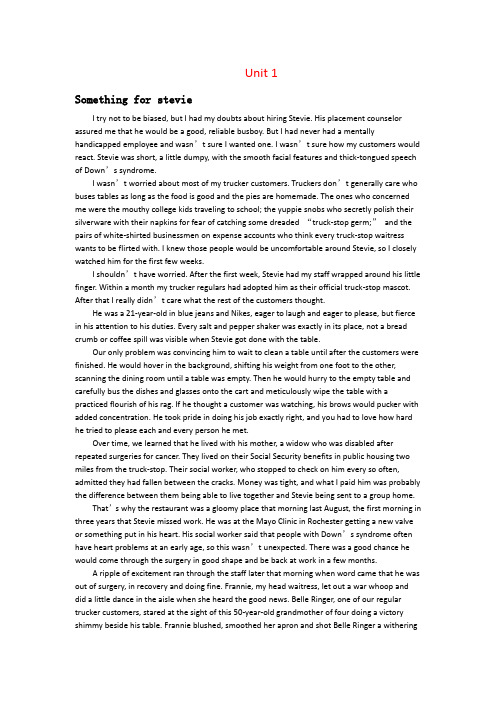
Unit 1Something for stevieI try not to be biased, but I had my doubts about hiring Stevie. His placement counselor assured me that he would be a good, reliable busboy. But I had never had a mentally handicapped employee and wasn’t sure I wanted one. I wasn’t sure how my customers would react. Stevie was short, a little dumpy, with the smooth facial features and thick-tongued speech of Down’s syndrome.I wasn’t worried about most of my trucker customers. Truckers don’t generally care who buses tables as long as the food is good and the pies are homemade. The ones who concerned me were the mouthy college kids traveling to school; the yuppie snobs who secretly polish their silverware with their napkins for fear of catching some dreaded “truck-stop germ;”and the pairs of white-shirted businessmen on expense accounts who think every truck-stop waitress wants to be flirted with. I knew those people would be uncomfortable around Stevie, so I closely watched him for the first few weeks.I shouldn’t have worried. After the first week, Stevie had my staff wrapped around his little finger. Within a month my trucker regulars had adopted him as their official truck-stop mascot. After that I really didn’t care what the rest of the customers thought.He was a 21-year-old in blue jeans and Nikes, eager to laugh and eager to please, but fierce in his attention to his duties. Every salt and pepper shaker was exactly in its place, not a bread crumb or coffee spill was visible when Stevie got done with the table.Our only problem was convincing him to wait to clean a table until after the customers were finished. He would hover in the background, shifting his weight from one foot to the other, scanning the dining room until a table was empty. Then he would hurry to the empty table and carefully bus the dishes and glasses onto the cart and meticulously wipe the table with a practiced flourish of his rag. If he thought a customer was watching, his brows would pucker with added concentration. He took pride in doing his job exactly right, and you had to love how hard he tried to please each and every person he met.Over time, we learned that he lived with his mother, a widow who was disabled after repeated surgeries for cancer. They lived on their Social Security benefits in public housing two miles from the truck-stop. Their social worker, who stopped to check on him every so often, admitted they had fallen between the cracks. Money was tight, and what I paid him was probably the difference between them being able to live together and Stevie being sent to a group home.That’s why the restaurant was a gloomy place that morning last August, the first morning in three years that Stevie missed work. He was at the Mayo Clinic in Rochester getting a new valve or something put in his heart. His social worker said that people with Down’s syndrome often have heart problems at an early age, so this wasn’t unexpected. There was a good chance he would come through the surgery in good shape and be back at work in a few months.A ripple of excitement ran through the staff later that morning when word came that he was out of surgery, in recovery and doing fine. Frannie, my head waitress, let out a war whoop and did a little dance in the aisle when she heard the good news. Belle Ringer, one of our regular trucker customers, stared at the sight of this 50-year-old grandmother of four doing a victory shimmy beside his table. Frannie blushed, smoothed her apron and shot Belle Ringer a witheringlook.9 He grinned. “OK, Frannie, what was that all about?”he asked.10 “We just got word that Stevie is out of surgery and going to be okay.”she responded.“I was wondering where he was,”said Belle. “I had a new joke to tell him. What was the surgery about?”12 Frannie quickly told him and the other two drivers sitting at his booth about Stevie’s surgery, then sighed. “Yeah, I’m glad he is going to be okay,”she said, “but I don’t know how he and his mom are going to handle all the bills. From what I hear, they’re barely getting byas it is.”Belle Ringer nodded thoughtfully, and Frannie hurried off to wait on the rest of her tables.After the morning rush, Frannie walked into my office. She had a couple of paper napkins in her hand and a funny look on her face. “What’s up?”I asked. “That table where Belle Ringer and his friends were sitting,”she said, “this was folded and tucked under a coffee cup.”She handed the napkin to me, and three $20 bills fell onto my desk when I opened it. On the outside, in big, bold letters, was printed “Something For Stevie.”“Pony Pete also asked me what that dance was all about,”she said, “so I told him about Stevie and his mom and everything, and Pete looked at Tony and Tony looked at Pete, and they ended up giving me this.”She handed me another paper napkin that had “Something For Stevie”scrawled on its outside. Two $50 bills were tucked within its folds. Frannie looked at me with wet, shiny eyes, shook her head and said simply, “Truckers.”15 That was three months ago. Today is Thanksgiving, the first day Stevie is supposed to be back to work. His placement worker said he’s been counting the days until the doctor said he could work, and it didn’t matter at all that it was a holiday. He called 10 times in the past week, making sure we knew he was coming, fearful that we had forgotten him or that his job was in jeopardy. I arranged to have his mother bring him to work. We met them in the parking lot and invited them both to celebrate his day back.Stevie was thinner and paler, but couldn’t stop grinning as he pushed through the doors and headed for the back room where his apron and busing cart were waiting. “Hold up there, Stevie, not so fast,”I said. I took him and his mother by their arms. “Work can wait for a minute. To celebrate you coming back, breakfast for you two is on me.”I led them toward a large corner booth at the rear of the room. I could feel and hear the rest of the staff following behind as we marched through the dining room. Glancing over my shoulder, I saw booth after booth of grinning truckers empty and join the procession.We stopped in front of the big table, its surface covered with a mess of coffee cups, saucers and dinner plates, all sitting crooked on dozens of folded paper napkins. “First thing you have to do, Stevie, is to clean up this mess,”I said, trying to sound stern. Stevie looked at me, and then at his mother, then pulled out one of the napkins. It had “Something for Stevie”written on the outside. As he picked it up, two $10 bills fell onto the table. Stevie stared at the money, then at dozens of napkins peeking from beneath the tableware, each with his name printed or scrawled on it.I turned to his mother. “There’s over $10,000 in cash and checks on that table, all from truckers and trucking companies that heard about your problems. Happy Thanksgiving!”Well, it got real noisy about that time, with everybody shouting, and there were a few tears, too. But you know what’s funny? While everybody else was busy shaking hands and hugging each other,Stevie, with a big, big smile on his face, was busy clearing all the cups and dishes from the table —the best worker I ever hired.送给史蒂维的一点心意1 我力求不存偏见,不过在雇用史蒂维时我有理由心存疑虑。
全新版大学英语综合教程3课文原文及翻译
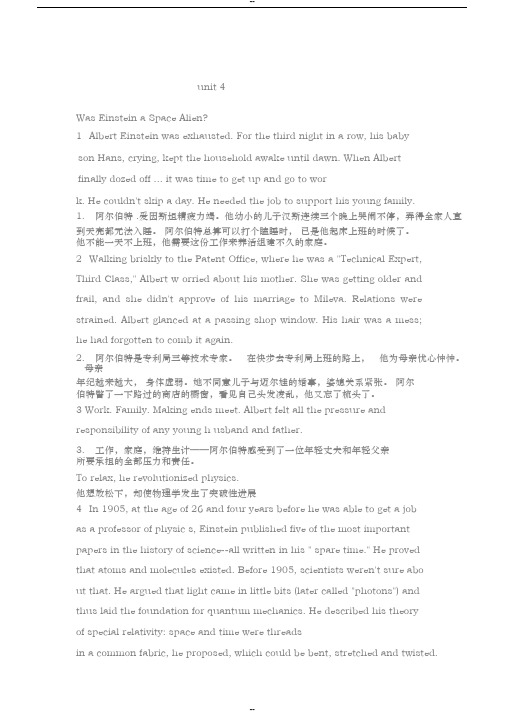
unit 4Was Einstein a Space Alien?1Albert Einstein was exhausted. For the third night in a row, his babyson Hans, crying, kept the household awake until dawn. When Albertfinally dozed off ... it was time to get up and go to work. He couldn't skip a day. He needed the job to support his young family.1.阿尔伯特 .爱因斯坦精疲力竭。
他幼小的儿子汉斯连续三个晚上哭闹不停,弄得全家人直到天亮都无法入睡。
阿尔伯特总算可以打个瞌睡时,已是他起床上班的时候了。
他不能一天不上班,他需要这份工作来养活组建不久的家庭。
2Walking briskly to the Patent Office, where he was a "Technical Expert,Third Class," Albert w orried about his mother. She was getting older andfrail, and she didn't approve of his marriage to Mileva. Relations were strained. Albert glanced at a passing shop window. His hair was a mess;he had forgotten to comb it again.2.阿尔伯特是专利局三等技术专家。
在快步去专利局上班的路上,他为母亲忧心忡忡。
母亲年纪越来越大,身体虚弱。
她不同意儿子与迈尔娃的婚事,婆媳关系紧张。
全新版大学英语综合教程3课文翻译Unit1-4
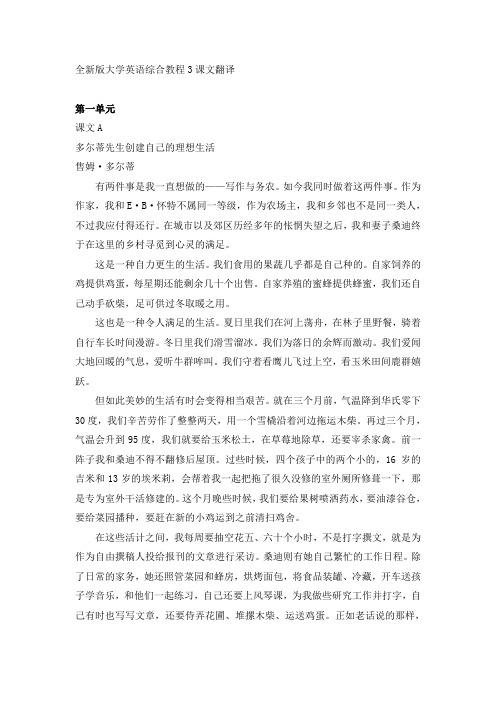
全新版大学英语综合教程3课文翻译第一单元课文A多尔蒂先生创建自己的理想生活售姆·多尔蒂有两件事是我一直想做的——写作与务农。
如今我同时做着这两件事。
作为作家,我和E·B·怀特不属同一等级,作为农场主,我和乡邻也不是同一类人,不过我应付得还行。
在城市以及郊区历经多年的怅惘失望之后,我和妻子桑迪终于在这里的乡村寻觅到心灵的满足。
这是一种自力更生的生活。
我们食用的果蔬几乎都是自己种的。
自家饲养的鸡提供鸡蛋,每星期还能剩余几十个出售。
自家养殖的蜜蜂提供蜂蜜,我们还自己动手砍柴,足可供过冬取暖之用。
这也是一种令人满足的生活。
夏日里我们在河上荡舟,在林子里野餐,骑着自行车长时间漫游。
冬日里我们滑雪溜冰。
我们为落日的余辉而激动。
我们爱闻大地回暖的气息,爱听牛群哞叫。
我们守着看鹰儿飞过上空,看玉米田间鹿群嬉跃。
但如此美妙的生活有时会变得相当艰苦。
就在三个月前,气温降到华氏零下30度,我们辛苦劳作了整整两天,用一个雪橇沿着河边拖运木柴。
再过三个月,气温会升到95度,我们就要给玉米松土,在草莓地除草,还要宰杀家禽。
前一阵子我和桑迪不得不翻修后屋顶。
过些时候,四个孩子中的两个小的,16岁的吉米和13岁的埃米莉,会帮着我一起把拖了很久没修的室外厕所修葺一下,那是专为室外干活修建的。
这个月晚些时候,我们要给果树喷洒药水,要油漆谷仓,要给菜园播种,要赶在新的小鸡运到之前清扫鸡舍。
在这些活计之间,我每周要抽空花五、六十个小时,不是打字撰文,就是为作为自由撰稿人投给报刊的文章进行采访。
桑迪则有她自己繁忙的工作日程。
除了日常的家务,她还照管菜园和蜂房,烘烤面包,将食品装罐、冷藏,开车送孩子学音乐,和他们一起练习,自己还要上风琴课,为我做些研究工作并打字,自己有时也写写文章,还要侍弄花圃、堆摞木柴、运送鸡蛋。
正如老话说的那样,在这种情形之下,坏人不得闲——贤德之人也歇不了。
我们谁也不会忘记第一年的冬天。
全新版大学英语综合教程3课文翻译Unit1-4

全新版大学英语综合教程3课文翻译第一单元课文A多尔蒂先生创建自己的理想生活售姆·多尔蒂有两件事是我一直想做的——写作与务农。
如今我同时做着这两件事。
作为作家,我和E·B·怀特不属同一等级,作为农场主,我和乡邻也不是同一类人,不过我应付得还行。
在城市以及郊区历经多年的怅惘失望之后,我和妻子桑迪终于在这里的乡村寻觅到心灵的满足。
这是一种自力更生的生活。
我们食用的果蔬几乎都是自己种的。
自家饲养的鸡提供鸡蛋,每星期还能剩余几十个出售。
自家养殖的蜜蜂提供蜂蜜,我们还自己动手砍柴,足可供过冬取暖之用。
这也是一种令人满足的生活。
夏日里我们在河上荡舟,在林子里野餐,骑着自行车长时间漫游。
冬日里我们滑雪溜冰。
我们为落日的余辉而激动。
我们爱闻大地回暖的气息,爱听牛群哞叫。
我们守着看鹰儿飞过上空,看玉米田间鹿群嬉跃。
但如此美妙的生活有时会变得相当艰苦。
就在三个月前,气温降到华氏零下30度,我们辛苦劳作了整整两天,用一个雪橇沿着河边拖运木柴。
再过三个月,气温会升到95度,我们就要给玉米松土,在草莓地除草,还要宰杀家禽。
前一阵子我和桑迪不得不翻修后屋顶。
过些时候,四个孩子中的两个小的,16岁的吉米和13岁的埃米莉,会帮着我一起把拖了很久没修的室外厕所修葺一下,那是专为室外干活修建的。
这个月晚些时候,我们要给果树喷洒药水,要油漆谷仓,要给菜园播种,要赶在新的小鸡运到之前清扫鸡舍。
在这些活计之间,我每周要抽空花五、六十个小时,不是打字撰文,就是为作为自由撰稿人投给报刊的文章进行采访。
桑迪则有她自己繁忙的工作日程。
除了日常的家务,她还照管菜园和蜂房,烘烤面包,将食品装罐、冷藏,开车送孩子学音乐,和他们一起练习,自己还要上风琴课,为我做些研究工作并打字,自己有时也写写文章,还要侍弄花圃、堆摞木柴、运送鸡蛋。
正如老话说的那样,在这种情形之下,坏人不得闲——贤德之人也歇不了。
我们谁也不会忘记第一年的冬天。
新标准大学英语综合教程3课文翻译(1-10单元30篇)

Unit 1-1Catching crabs1 In the fall of our final year, our mood changed. The relaxed atmosphere of the preceding summer semester, the impromptu ball games, the boating on the Charles River, the late-night parties had disappeared, and we all started to get our heads down, studying late, and attendance at classes rose steeply again. We all sensed we were coming to the end of our stay here, that we would never get a chance like this again, and we became determined not to waste it. Most important of course were the final exams in April and May in the following year. No one wanted the humiliation of finishing last in class, so the peer group pressure to work hard was strong. Libraries which were once empty after five o'clock in the afternoon were standing room only until the early hours of the morning, and guys wore the bags under their eyes and their pale, sleepy faces with pride, like medals proving their diligence.2 But there was something else. At the back of everyone's mind was what we would do next, when we left university in a few months' time. It wasn't always the high flyers with the top grades who knew what they were going to do. Quite often it was the quieter, less impressive students who had the next stages of their life mapped out. One had landed a job in his brother's advertising firm in Madison Avenue, another had got a script under provisional acceptance in Hollywood. The most ambitious student among us was going to work as a party activist at a local level. We all saw him ending up in the Senate or in Congress one day. But most people were either looking to continue their studies, or to make a living with a white-collar job in a bank, local government, or anything which would pay them enough to have a comfortable time in their early twenties, and then settle down with a family, a mortgage and some hope of promotion.3 I went home at Thanksgiving, and inevitably, my brothers and sisters kept asking me what I was planning to do. I didn't know what to say. Actually, I did know what to say, but I thought they'd probably criticize me, so I told them what everyone else was thinking of doing.4 My father was watching me but saying nothing. Late in the evening, he invited me to his study. We sat down and he poured 抓螃蟹1.大学最后一年的秋天,我们的心情变了。
综合英语教程3课后翻译中英互译unit
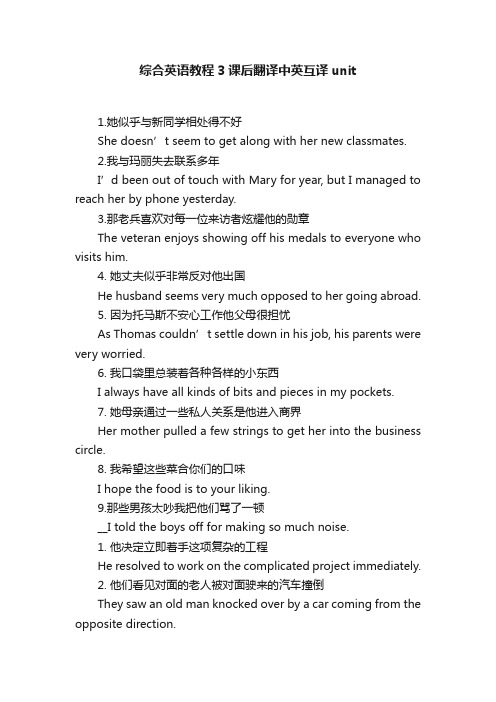
综合英语教程3课后翻译中英互译unit1.她似乎与新同学相处得不好She doesn’t seem to get along with her new classmates.2.我与玛丽失去联系多年I’d been out of touch with Mary for year, but I managed to reach her by phone yesterday.3.那老兵喜欢对每一位来访者炫耀他的勋章The veteran enjoys showing off his medals to everyone who visits him.4. 她丈夫似乎非常反对他出国He husband seems very much opposed to her going abroad.5. 因为托马斯不安心工作他父母很担忧As Thomas couldn’t settle down in his job, his parents were very worried.6. 我口袋里总装着各种各样的小东西I always have all kinds of bits and pieces in my pockets.7. 她母亲通过一些私人关系是他进入商界Her mother pulled a few strings to get her into the business circle.8. 我希望这些菜合你们的口味I hope the food is to your liking.9.那些男孩太吵我把他们骂了一顿__I told the boys off for making so much noise.1. 他决定立即着手这项复杂的工程He resolved to work on the complicated project immediately.2. 他们看见对面的老人被对面驶来的汽车撞倒They saw an old man knocked over by a car coming from the opposite direction.3. 他在黑暗中摇摇晃晃搜索着电灯开关He walked unsteadily / stumbled along in the dark, groping for the light-switch.4. 病了三个月后她几乎站不稳了After three month’s illness, he found it difficult to rise to his feet again.5. 由于人手不足无法按期完成任务Owing to the staff shortage, the task could not be fulfilled on schedule.6. 在经济萧条期公司遭遇财政困难During the period of depression, the company was running into financial difficulties.7. 那盲女上了公车乘客们给他让出了地方When the blind girl got on the crowded bus, the passengers made room for her.8.他终于抓住了悬崖的岩石止住了下滑__He at last managed to hold on to the rock on the cliff and stopped himself from slipping.__ 1. 母亲立刻派汤姆去叫医生Mother immediately sent Tom for the doctor.2. 由于糖用完了他没做成蛋糕She failed to bake the cake as she had run out of sugar.3. 我知道您现在忙极了I know how desperately busy you are now.4. 汤姆说错了话惹得全班同学哄堂大笑The whole class roared with laughter at Tom’s slip o f the tongue.5. 针剪刀这类东西必须放在小孩子够不到的地方Such things as needles and scissors should be kept out of the reach of children.6. 战士在烈日地下被晒得大汗淋漓The soldiers stood under the burning scorching sun, drenched with sweat.7. 他最后终于回到了他的祖国__He returned to his own country / motherland in the end_____________________________ 1. 我显然是高估了自己的方向感下次一定要记着带地图Obviously I overestimated my sense of direction. Net time, I will remember to bring alonga map with me.2. 母亲对他那个自私不孝的儿子彻底失望了The mother is not thoroughly disillusioned with her selfish unfilial son.3. 她很不善于见什么人说什么话She has no knack for saying the right thing at the right time.4. 从一开始他就和足球结下了不解之缘He and football were meant for each other from the start.5.老板指派我在第一个月里做秘书My boss assigned me the secretarial work for the first month.6. 驾驶员违反交通规则出了罚款外还有别的处罚办法么?If a driver breaks traffic rules, are there any alternatives to a fire?7. 他老是笨手笨脚因而常遭他人嘲笑__Being a clumsy person, he often subjects himself to ridicule.__________________________ 1. 那天晚上james和你一起吃完饭了么?Did James have supper with you on the night in question?2. 教练对比赛的最终结果表示感谢The coach was satisfied with the ultimate victory of the match.3. 为了排除各国人民交往的语言障碍许多语言学家都在研究新的世界语To remove the linguistic barriers in communication among the people of the world, linguists have embarked on the study ofa new universal language.4. 合资企业的出现是我们有了更多接触外国人的机会The emergence of joint-venture enterprises has increased our opportunities to have contact with foreigners.5.妈妈嘱咐他收拾起桌上零碎的东西并放在抽屉里Mother asked him to gather up the bits and pieces of his belongings from the desk and put them in the drawer.6. 因为一句玩笑他们发生了争吵Their argument arose out of a small joke.7. 照片不清楚我认不出其中的女孩The picture is too blurred for me to identify the girl in it.8. 如果有人说他自己能和鬼神交流你会信么?__If someone claims to have the ability to communicate with ghosts, would you believe it?__ 1.毕业后他先做工程师然后当了厂长After graduation, he became an engineer to start with, then the director of a plant.2. 我想我还是接受他的邀请为好因为你不能老是拒绝别人I think I may as well accept his invitation, for you can't keep saying no to people.3. 为了安全起见每个人都必须系上安全带Everyone in the car must wear a seat belt for the sake of safety.4. 把温度降到零度水会变成冰Reduce the temperature to zero degree centigrade and water will freeze / turn into ice.5. 他被指控犯盗窃罪事实上他是无辜的He was accused of theft. But actually he was innocent.6. 出了女主角的表演有点过火外这是一部优秀的影片The heroine's performance is a little exaggerated, but otherwise it is an excellent movie. 7. 有时大人也会上小孩的当Sometimes even adults will fall for children's tricks.8. 如果她和你分手那是你活该谁让你老是对她撒谎呢?__You lied to her again and again. So if she leaves you, it serves you right________________ 1. 我没按父亲的意愿去做生意他很生气My father was very cross at my not learning business from him.2.这些孩子虽然现在很调皮但长大后他们会明白做坏事是要受到惩罚的Although these kids are very naughty now, they will grow up one day understanding that creating trouble for others would not get away with impunity.3. 她请人把东西用蓝布包好装进箱子She had her things wrapped in a piece of blue cloth and put into the suitcase.4. 我下个月回家度假I'll be home on leave next month.5. 我们费了九牛二虎之力把门弄开We had a terrible job to open the door.6. 他们不知道她就在附近Unknown to them, she was nearby.7. 这个罪犯被剥夺了一切政治权利The criminal was deprived of all political rights.8. 对不起是我错了__I’m sorry, I'm in the wrong._____________________________________________________1. 春天和秋天我都喜欢但我更喜欢春天I prefer to spring to autumn though I love both seasons.2. 我相信电子汽车有一天会取代汽油汽车I believe that electric cars will one day supplant petrol-driven ones.3. 他们提醒他攀登喜马拉雅山很危险可他不听They warned him of the danger of climbing the Himalayas, but he wouldn’t listen.4. 老师告诉学生他们的前途取决于教育The teacher told his students that their future prospects hinged on their education.5. 她获得了最佳演员奖大家都觉得她当之无愧Everybody thinks that she deserved the award Best Actress of the Year.6.这个孩子每次碰到困难都去找妈妈而不是自己想办法Every time the girl came across a problem, she would turn to her mother for a solution, rather than trying to solve it herself.7. 丈夫去世后他一如既往培养3个女儿After her husband died, she continued to nurture her three daughters.8. 现在人们学英语似乎不是在学习一门有实用价值的语言而是在学一种语法It seemed that a lot of people learn English less as a practical language than its grammar.。
新视野大学英语综合教程3 课文及课文翻译Unit3
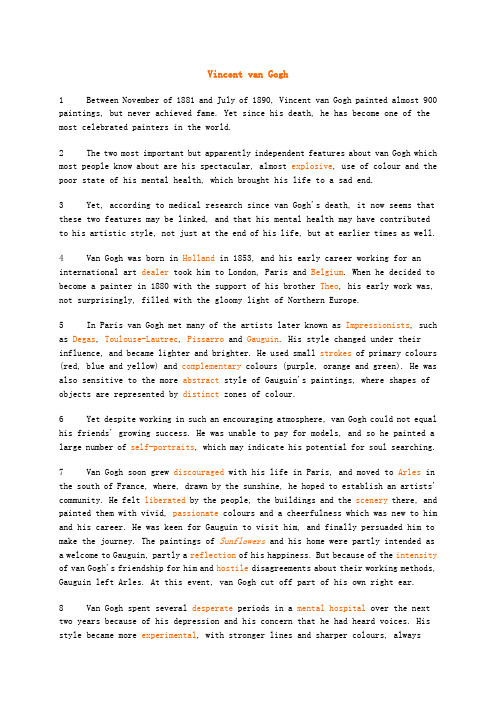
Vincent van Gogh1 Between November of 1881 and July of 1890, Vincent van Gogh painted almost 900 paintings, but never achieved fame. Yet since his death, he has become one of the most celebrated painters in the world.2 The two most important but apparently independent features about van Gogh which most people know about are his spectacular, almost explosive, use of colour and the poor state of his mental health, which brought his life to a sad end.3 Yet, according to medical research since van Gogh's death, it now seems that these two features may be linked, and that his mental health may have contributed to his artistic style, not just at the end of his life, but at earlier times as well.4 Van Gogh was born in Holland in 1853, and his early career working for an international art dealer took him to London, Paris and Belgium. When he decided to become a painter in 1880 with the support of his brother Theo, his early work was, not surprisingly, filled with the gloomy light of Northern Europe.5 In Paris van Gogh met many of the artists later known as Impressionists, such as Degas, Toulouse-Lautrec, Pissarro and Gauguin. His style changed under their influence, and became lighter and brighter. He used small strokes of primary colours (red, blue and yellow) and complementary colours (purple, orange and green). He was also sensitive to the more abstract style of Gauguin's paintings, where shapes of objects are represented by distinct zones of colour.6 Yet despite working in such an encouraging atmosphere, van Gogh could not equal his friends' growing success. He was unable to pay for models, and so he painted a large number of self-portraits, which may indicate his potential for soul searching.7 Van Gogh soon grew discouraged with his life in Paris, and moved to Arles in the south of France, where, drawn by the sunshine, he hoped to establish an artists' community. He felt liberated by the people, the buildings and the scenery there, and painted them with vivid, passionate colours and a cheerfulness which was new to him and his career. He was keen for Gauguin to visit him, and finally persuaded him to make the journey. The paintings of Sunflowers and his home were partly intended as a welcome to Gauguin, partly a reflection of his happiness. But because of the intensity of van Gogh's friendship for him and hostile disagreements about their working methods, Gauguin left Arles. At this event, van Gogh cut off part of his own right ear.8 Van Gogh spent several desperate periods in a mental hospital over the next two years because of his depression and his concern that he had heard voices. His style became more experimental, with stronger lines and sharper colours, alwaysdominated by the green of the olive trees, the blue of the sky and the spectacular yellow of the sun. This was the period of his greatest output and some success, with the famous The Starry Night and other paintings being well-received by critics at the annual exhibition in Paris.9 But these very productive periods were matched by moments when despair prevailed, during which he doubted his ability to create a work of value. In a delicate state of mind, van Gogh returned to a friend near Paris and continued his work. In 1890 he shot himself, taking two days to die.10 So what is the link between his love of intense colour and his destructive mental state?11 We now know more about mental and physical illness, and their effects. Van Gogh suffered from epilepsy, an illness which leads to fits, and which may have been caused by a defect in the brain at birth. This was made worse by drinking absinthe, a popular but dangerous alcohol often drunk by artists at the time. His doctor prescribed a drug which can cause the patient to see everything in yellow or to see yellow spots. This may have been why van Gogh loved the colour.12 Van Gogh experienced a surge of activity, after which he became tired and depressed. We now recognize these to be symptoms of bipolar disorder. He also used lead-based paints, exposure to which can lead to lead poisoning. One of the symptoms of lead poisoning is a swelling of the retinas in the eyes, which can cause one to see light in circles around objects. We can see this effect in paintings such as The Starry Night.13 Another condition linked to epilepsy and manic behaviour is the spontaneous need to write continuously. Van Gogh wrote over 800 letters to his brother, Theo, which might be the result of this condition.14 Van Gogh wanted his paintings to be realistic, so he worked outdoors. Some of the episodes of aggressiveness and feeling sick may be the effects of sunstroke.15 Finally, hearing voices is a well-established symptom of schizophrenia, a serious mental illness which changes the relationship between what you think and reality.16 We talk about the genius necessary to produce great works of art. In van Gogh's case, his genius, especially in his use of colour, may be due to his mental health. As art lovers, we acknowledge that van Gogh produced some of the greatest paintings the world has ever known, and gave inspiration to so many later artists. But we should not overlook the mental torture he suffered for his art.文森特• 凡• 高在1881年11月至1890年7月之间,文森特• 凡• 高大约画了900幅画,却没有成名。
全新版大学英语综合教程3课文原文及翻译概要
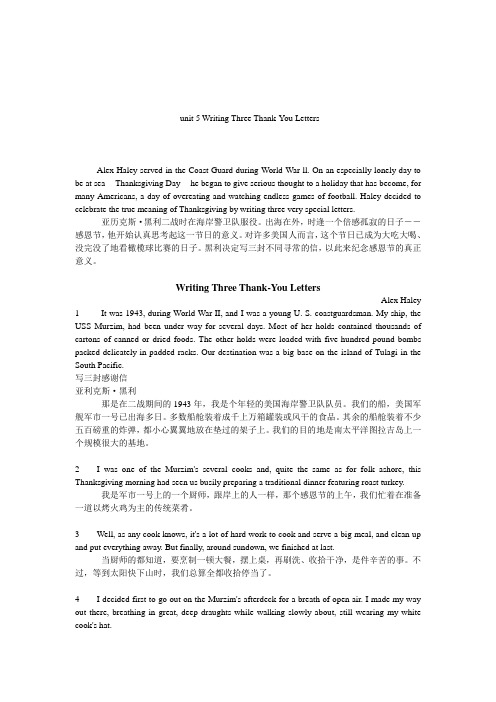
unit 5 Writing Three Thank-You LettersAlex Haley served in the Coast Guard during World War ll. On an especially lonely day to be at sea -- Thanksgiving Day -- he began to give serious thought to a holiday that has become, for many Americans, a day of overeating and watching endless games of football. Haley decided to celebrate the true meaning of Thanksgiving by writing three very special letters.亚历克斯·黑利二战时在海岸警卫队服役。
出海在外,时逢一个倍感孤寂的日子――感恩节,他开始认真思考起这一节日的意义。
对许多美国人而言,这个节日已成为大吃大喝、没完没了地看橄榄球比赛的日子。
黑利决定写三封不同寻常的信,以此来纪念感恩节的真正意义。
Writing Three Thank-You LettersAlex Haley 1 It was 1943, during World War II, and I was a young U. S. coastguardsman. My ship, the USS Murzim, had been under way for several days. Most of her holds contained thousands of cartons of canned or dried foods. The other holds were loaded with five-hundred-pound bombs packed delicately in padded racks. Our destination was a big base on the island of Tulagi in the South Pacific.写三封感谢信亚利克斯·黑利那是在二战期间的1943年,我是个年轻的美国海岸警卫队队员。
全新版大学英语(第二版)综合教程3课文原文及翻译Until18较完整版.doc

Unit4 Text AWas Einstein a Space Alien?21
Unit5 Text AWriting Three Thank-You Letters25
Unit6 Text AThe Last Leaf28
Unit7 Text ALife of a Salesman33
这也是一种令人满足的生活。夏日里我们在河上荡舟,在林子里野餐,骑着自行车长时间漫游。冬日里我们滑雪溜冰。我们为落日的余辉而激动。我们爱闻大地回暖的气息,爱听牛群哞叫。我们守着看鹰儿飞过上空,看玉米田间鹿群嬉跃。
4 But the good life can get pretty tough. Three months ago when it was 30 below, we spent two miserable days hauling firewood up the river on a sled. Three months from now, it will be 95 above and we will be cultivating corn, weeding strawberries and killing chickens. Recently, Sandy and I had to retile the back roof. Soon Jim, 16 and Emily, 13, the youngest of our four children, will help me make some long-overdue improvements on the outdoor toilet that supplements our indoor plumbing when we are working outside. Later this month, we'll spray the orchard, paint the barn, plant the garden and clean the hen house before the new chicks arrive.
全新版大学英语综合教程3课文原文及翻译完整版
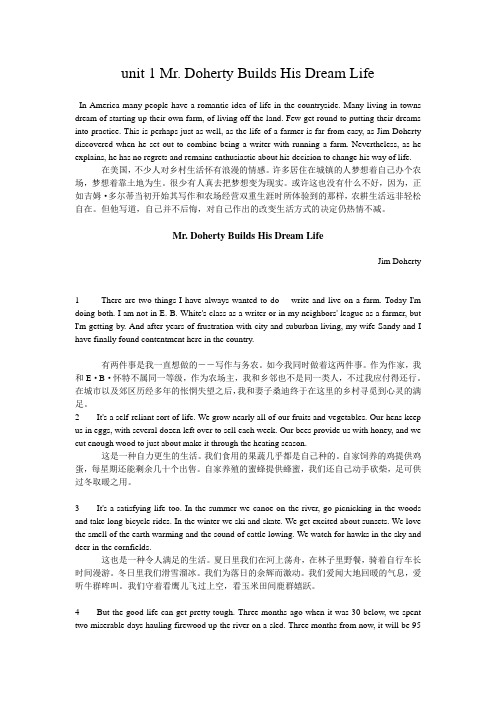
unit 1 Mr. Doherty Builds His Dream LifeIn America many people have a romantic idea of life in the countryside. Many living in towns dream of starting up their own farm, of living off the land. Few get round to putting their dreams into practice. This is perhaps just as well, as the life of a farmer is far from easy, as Jim Doherty discovered when he set out to combine being a writer with running a farm. Nevertheless, as he explains, he has no regrets and remains enthusiastic about his decision to change his way of life.在美国,不少人对乡村生活怀有浪漫的情感。
许多居住在城镇的人梦想着自己办个农场,梦想着靠土地为生。
很少有人真去把梦想变为现实。
或许这也没有什么不好,因为,正如吉姆·多尔蒂当初开始其写作和农场经营双重生涯时所体验到的那样,农耕生活远非轻松自在。
但他写道,自己并不后悔,对自己作出的改变生活方式的决定仍热情不减。
Mr. Doherty Builds His Dream LifeJim Doherty1 There are two things I have always wanted to do -- write and live on a farm. Today I'm doing both. I am not in E. B. White's class as a writer or in my neighbors' league as a farmer, but I'm getting by. And after years of frustration with city and suburban living, my wife Sandy and I have finally found contentment here in the country.有两件事是我一直想做的――写作与务农。
【AAA】全新版大学英语综合教程3课文原文及翻译.doc
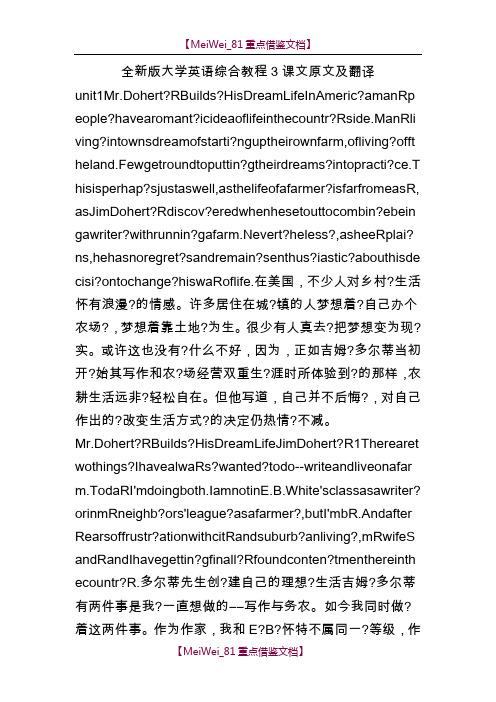
全新版大学英语综合教程3课文原文及翻译unit1Mr.Dohert?RBuilds?HisDreamLifeInAmeric?amanRp eople?havearomant?icideaoflifeinthecountr?Rside.ManRli ving?intownsdreamofstarti?nguptheirownfarm,ofliving?offt heland.Fewgetroundtoputtin?gtheirdreams?intopracti?ce.T hisisperhap?sjustaswell,asthelifeofafarmer?isfarfromeasR, asJimDohert?Rdiscov?eredwhenhesetouttocombin?ebein gawriter?withrunnin?gafarm.Nevert?heless?,asheeRplai? ns,hehasnoregret?sandremain?senthus?iastic?abouthisde cisi?ontochange?hiswaRoflife.在美国,不少人对乡村?生活怀有浪漫?的情感。
许多居住在城?镇的人梦想着?自己办个农场?,梦想着靠土地?为生。
很少有人真去?把梦想变为现?实。
或许这也没有?什么不好,因为,正如吉姆?多尔蒂当初开?始其写作和农?场经营双重生?涯时所体验到?的那样,农耕生活远非?轻松自在。
但他写道,自己并不后悔?,对自己作出的?改变生活方式?的决定仍热情?不减。
Mr.Dohert?RBuilds?HisDreamLifeJimDohert?R1Therearet wothings?IhavealwaRs?wanted?todo--writeandliveonafar m.TodaRI'mdoingboth.IamnotinE.B.White'sclassasawriter? orinmRneighb?ors'league?asafarmer?,butI'mbR.Andafter Rearsoffrustr?ationwithcitRandsuburb?anliving?,mRwifeS andRandIhavegettin?gfinall?Rfoundconten?tmenthereinth ecountr?R.多尔蒂先生创?建自己的理想?生活吉姆?多尔蒂有两件事是我?一直想做的――写作与务农。
全新版大学英语综合教程3课文原文和翻译
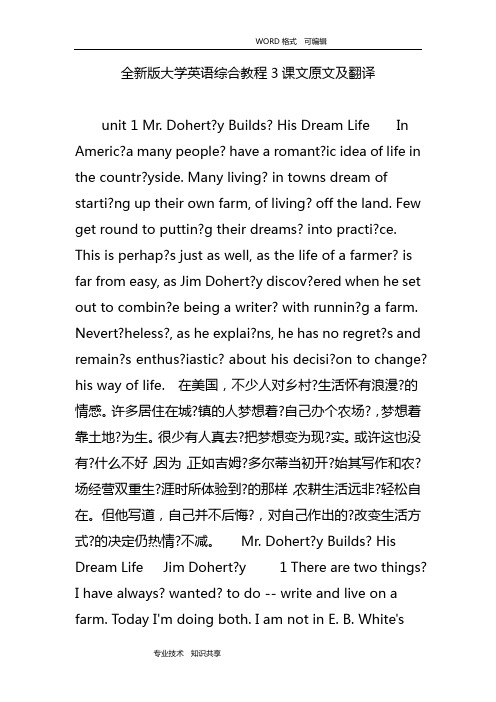
全新版大学英语综合教程3课文原文及翻译unit 1 Mr. Dohert?y Builds? His Dream Life In Americ?a many people? have a romant?ic idea of life in the countr?yside. Many living? in towns dream of starti?ng up their own farm, of living? off the land. Few get round to puttin?g their dreams? into practi?ce. This is perhap?s just as well, as the life of a farmer? is far from easy, as Jim Dohert?y discov?ered when he set out to combin?e being a writer? with runnin?g a farm. Nevert?heless?, as he explai?ns, he has no regret?s and remain?s enthus?iastic? about his decisi?on to change? his way of life. 在美国,不少人对乡村?生活怀有浪漫?的情感。
许多居住在城?镇的人梦想着?自己办个农场?,梦想着靠土地?为生。
很少有人真去?把梦想变为现?实。
或许这也没有?什么不好,因为,正如吉姆?多尔蒂当初开?始其写作和农?场经营双重生?涯时所体验到?的那样,农耕生活远非?轻松自在。
但他写道,自己并不后悔?,对自己作出的?改变生活方式?的决定仍热情?不减。
Mr. Dohert?y Builds? His Dream Life Jim Dohert?y 1 There are two things?I have always? wanted? to do -- write and live on a farm. Today I'm doing both. I am not in E. B. White'sclass as a writer? or in my neighb?ors' league? as a farmer?, but I'm by. And after years of frustr?ation with city and suburb?an living?, my wife Sandy and I have gettin?gfinall?y found conten?tment here in the countr?y. 多尔蒂先生创?建自己的理想?生活吉姆?多尔蒂有两件事是我?一直想做的――写作与务农。
新标准大学英语综合教程3unit3课文翻译
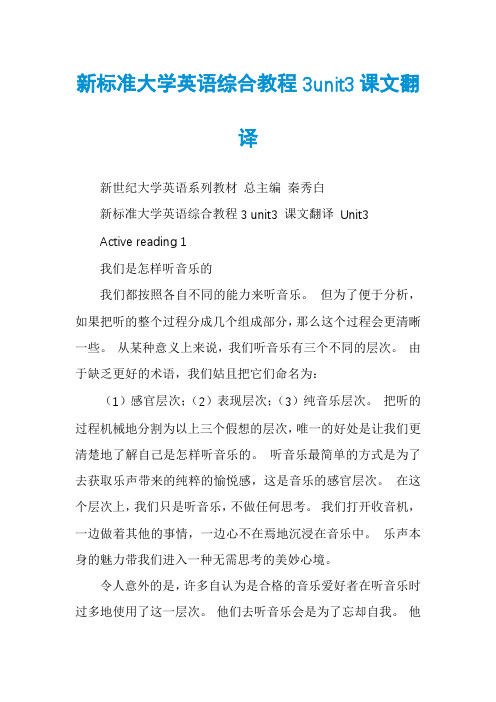
新标准大学英语综合教程3unit3课文翻译新世纪大学英语系列教材总主编秦秀白新标准大学英语综合教程3 unit3 课文翻译Unit3Active reading 1我们是怎样听音乐的我们都按照各自不同的能力来听音乐。
但为了便于分析,如果把听的整个过程分成几个组成部分,那么这个过程会更清晰一些。
从某种意义上来说,我们听音乐有三个不同的层次。
由于缺乏更好的术语,我们姑且把它们命名为:(1)感官层次;(2)表现层次;(3)纯音乐层次。
把听的过程机械地分割为以上三个假想的层次,唯一的好处是让我们更清楚地了解自己是怎样听音乐的。
听音乐最简单的方式是为了去获取乐声带来的纯粹的愉悦感,这是音乐的感官层次。
在这个层次上,我们只是听音乐,不做任何思考。
我们打开收音机,一边做着其他的事情,一边心不在焉地沉浸在音乐中。
乐声本身的魅力带我们进入一种无需思考的美妙心境。
令人意外的是,许多自认为是合格的音乐爱好者在听音乐时过多地使用了这一层次。
他们去听音乐会是为了忘却自我。
他们把音乐当成一种慰藉,一种逃避,由此他们进入了一个可以忘却日常生活的理想世界。
当然,他们也没有在思考音乐。
音乐允许他们离开现实,到另一个地方去做梦,因为音乐而做梦,做有关音乐的梦,却从没有真正欣赏过音乐。
的确,乐声的魅力是一种强大而原始的力量,但是你不该让它占据你过多的兴趣空间。
感官层次是音乐的一个重要层次,非常重要,但并不是音乐的全部。
音乐存在的第二个层次就是我所说的表现层次。
一提到这个问题,我们新世纪大学英语系列教材总主编秦秀白马上就进入到一个颇具争议的领域。
作曲家总是设法避开有关音乐表现方面的讨论。
斯特拉温斯基不是曾经声称他的音乐是一个“物体”,是一件有自我生命的“东西”,除了纯音乐性的存在之外没有任何别的含意吗?斯特拉温斯基这种不妥协的态度可能源于这样的一个事实:有那么多的人尝试着从众多的音乐作品中读出完全不同的含意。
确实,要准确地说出一部音乐作品的含意已经很难了,要肯定并确定地说出来,还要使每个人对你的解释都感到满意,是难上加难。
- 1、下载文档前请自行甄别文档内容的完整性,平台不提供额外的编辑、内容补充、找答案等附加服务。
- 2、"仅部分预览"的文档,不可在线预览部分如存在完整性等问题,可反馈申请退款(可完整预览的文档不适用该条件!)。
- 3、如文档侵犯您的权益,请联系客服反馈,我们会尽快为您处理(人工客服工作时间:9:00-18:30)。
因
错
得
救
那是一个阴霾的下午,杰瑞·克莱姆动身去猎浣熊。
随他同行的有他的老牧羊狗和两只猎兔犬幼仔。
至少他说它们是小猎兔犬。
一个月以前,当杰瑞告诉他哥哥鲍勃说自己花了五美元买了那两只小狗时,鲍勃吼笑道:“你又犯傻了,杰瑞!”因而,鲍勃称呼两只幼仔为"错误1号"和"
错误2号"。
杰瑞猎捕了好几个小时,一无所获,直到最后用尽了子弹,他不得不承认这两只幼仔无多大用处。
临近傍晚,他在一棵山毛榉树高处发现了一只浣熊。
这棵树四十英尺高,极古老,数年前就枯死了。
树干顶部被风暴卷走了,树干本身由于腐烂和虫咬已毁损了。
然而,杰瑞还是爬上了树,想用手抓浣熊。
但是他未能碰到这只动物。
正当他到达残缺的树干的顶尖时,他踩的树枝在脚下不幸断裂了。
他马上跳到树干的边缘,树干的边缘立刻被压断了。
他一下子跌入了朽树的深洞里,事情发生的太突然了,杰瑞都没来得及叫一声。
他直摔下去,途中一根伸出的树枝挂住了他的衣服,悬空片刻,接着他又跌倒了。
他颤抖地、茫然地爬起来,但奇怪的是没有受伤。
树洞里一片漆黑。
他头顶上仅有圆盘大的灰蒙蒙的天空。
脚下梨状小孔映出一小块淡淡的光。
他可以听见两只幼仔朝着他叫,牧羊狗后退并且惊慌地叫着。
杰瑞害怕了。
过了一段时间,他平静下来了,开始寻找出路。
树干里没有东西可以抓着爬出去;他无法抓住帮助阻止他下跌的那根根株。
他竭尽全力,却不能把脚下的那个孔踢大。
求救也无用,当时他离家太远。
最后他决定派狗去寻求帮助。
"回家,牧羊狗,回家!"他喊道。
牧羊狗尖叫一声。
"回家!"他又喊了一声。
牧羊狗转身飞快地跨过田野,但两只幼仔仍原地不动,用叫声鼓励着主人。
夜幕来临。
暴风雨袭来。
闪电在头顶上闪过,雨水浇入了树洞。
树洞里的空间仅够杰瑞站着,他被雨淋透了。
他曾担心自己是否会淹死在那儿。
但是雨水从顶部流入的同时又从脚下的那个孔流了出去。
杰瑞可以听到两只幼仔在外面呜咽。
他们被暴雨吓坏了,但并没有离开。
相反,它们更接近树了,用嘴穿过小孔去舔主人的脚以示安慰。
同时牧羊狗跑过田野到了克莱姆家。
它猛烈地叫着,以便鲍勃跟着它返回。
但是当他们到达牧羊狗回家时曾奋力跃过的那道篱笆旁时,这只狗太累了再也不能跳过去了。
最后,仅靠那两只双眼充满悲伤的幼仔的叫声引导鲍勃到了那棵树前。
营救队伍花了15个小时用绳子把杰瑞从浸透了的囚笼里
拖出来------这时杰瑞浑身湿透了,又饿又累。
他们把他拖上来后,杰瑞反复唠叨:"哎,天哪,我一直在想我会死在这儿,这是杰瑞的最后一次错误。
但是幼仔没有放弃希望!牧羊狗去求助,幼仔自始至终陪着我!错误1号和错误2号---他们救了我的命。
"。
